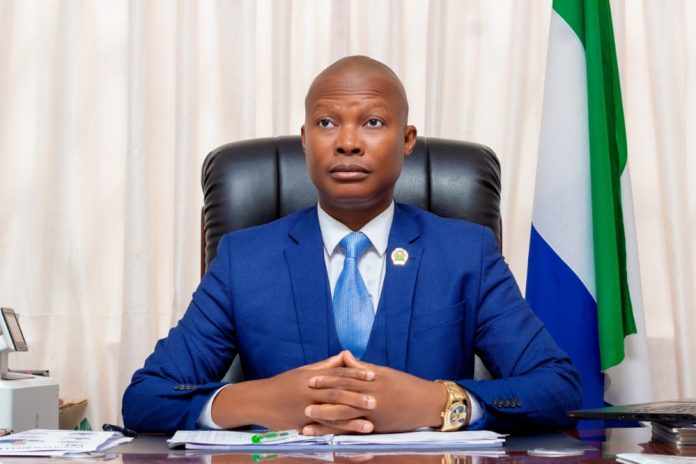By Amin Kef Sesay
The Petroleum Regulatory Agency was established by an Act of Parliament in 2014 to grant licenses and regulate the downstream sector.
Over the years, the entity has been lacking the required leadership needed to realize its full potential despite its revenue potential.
Having been in the corporate world for years with outstanding and indelible performance, Brima Baluwa Koroma was appointed as the Executive Chairman of PRA by His Excellency, President Julius Maada Bio to be part of the New Direction’s transformation drive; an appointment which has added a cap in the feather of the Government’s revenue mobilization initiative.
“We came in at a time when the sector was in desperate need of reform as unresolved challenges continued to impact the sector with weak investor appetite. The sector was constellated with limited players, frequent supply disruption and declined Government revenue,” said Baluwa Koroma, Executive Chairman of PRA while explaining the status of PRA when the New Direction Government of His Excellency, President Julius Maada Bio took over in 2018.
Three years at the helms of affairs at the PRA, the Executive Chairman has been able to institute reforms that have helped to sanitize the downstream sector, by restoring investor’s confidence and opening market space for new players like the All Petroleum Products who are set to start full-scale operation as an oil marketing company in the country.
How he made this possible, he explained: “My leadership started off by having a relentless focus on three critical areas; Firstly by developing policies to open up the market space, restoring fairness in the industry to all players that will increase sector efficiency and transparency.
Secondly, by focusing on initiatives to develop the petroleum industry infrastructure to attract new players to look at the possibility of resuscitating our oil refinery, constructing tank farms across the regions, bulk transportation and retailing as this will enhance petroleum product security and affordability and lastly, by enforcing compliance through our District Monitoring Officers to our petroleum laws and tax commitments”.
Before now, little or nothing was known of the performance of the downstream sector and the untapped opportunities available for investors. But transparency and accountability are the mantras of the New Direction, petroleum revenue under the dynamic PRA Chief increased from Le473billion in 2018 to Le753billion in 2020.
This remarkable achievement was made possible due to robust monitoring and efficient revenue management reforms brought in by the PRA boss and the sector now contributes 15% to the country’s domestic revenue drive.
In the past, fuel is being considered a political commodity which has the tendency to make any Government unpopular. But despite the volatility and unpredictability of the sector, which sometimes affect both producers and importers, the sector has been able to make fuel a necessity in the country despite Sierra Leone being a net importing country with private sector dominance.
Immediately he took over in 2018, Brima Baluwa Koroma adopted a human-face approach by constantly monitoring available stocks of oil marketing companies and appropriately advised them to have an adequate supply. This made petroleum importation grew by 27.9% from 340,060 metric tons in 2018 to 459,960 metric tons in 2020 and annual sales and distribution recorded 416 million litres in 2020 with an improved run-rate expected in 2021.
Platts, which is another determiner for the price of fuel, used to be another challenge for the Agency and they used to rely on data from oil marketing companies to know whether there would be any increase or decrease in the world market. This made the Agency to be in a disadvantaged position to know movement in the world market.
Today, PRA has its own Platts with twenty-four hours updates which have made them follow every trend in the world market.
The outbreak of Coronavirus affected institutions and brought numerous challenges across the world. Amidst those challenges, the PRA was able to maintain its financial performance. According to Baluwa Koroma, the Government policy during the COVID-19 was to ensure access to adequate, reliable and cost-effective petroleum products and this was why the country never went out of supply despite those lockdowns and halt in sea transportation.
“Global Oil prices are exogenous and continued to be affected by sharp volatility between May and December 2020. There were situations when Serra Leone recorded a combined increase in platts price and exchange rate depreciation which resulted in a significant breach of the 5% trigger mechanism, Government decided to keep the pump price unchanged at Le7,000 per litre, which was below the market price, this cost Government Le83bn as this was to cushion the effect of the pandemic given the loss of jobs and income.
This presupposes that Sierra Leone was selling the lowest pump price in the sub-region. The objective was to reduce the already socio-economic burden on the people during the COVID-19 pandemic. This also poses a huge challenge on the fiscal space for the Government as other sectors were either shut down or operating at a bare minimum,” he said.
Responding to where he would want to see the Agency in the future, Baluwa Koroma said that despite the numerous successes at PRA, their focus is to create a viable industry so that every sector within the value chain get the most of their regulatory framework as there is a clear trend towards an improved service delivery sector, maximized economic benefits and improved revenue for the Government.
“The outlook is very promising; we want the Government to participate in the value chain, having a potentially storage depot, the regulatory agency to become a principal custodian of petroleum stock and serves as a last resort in times of emergency. The country has a modern port and enjoys a natural harbour with 13 meters on high tide, Sierra Leone is well placed to become a petroleum hub for the Mano River Basin,” he assured.




